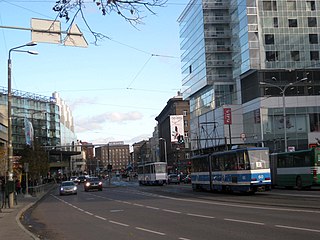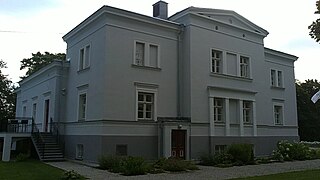
Narva is a municipality and city in Estonia. It is located in the Ida-Viru County, at the eastern extreme point of Estonia, on the west bank of the Narva river which forms the Estonia–Russia international border. With 53,626 inhabitants Narva is Estonia's third largest city after capital Tallinn and Tartu.

Ivangorod is a town in Kingiseppsky District of Leningrad Oblast, Russia, located on the east bank of the Narva river which flows along the Estonia–Russia international border, 159 kilometers (99 mi) west of Saint Petersburg, 218 kilometers (135 mi) east of Tallinn, Estonia. The town's population was recorded as 9,854 (2010 Census); 11,206 (2002 Census); 11,833 (1989 Soviet census).
This is a list of the extreme points on land of Estonia: the points that are farther north, south, east or west than any other location.

Narva College of the University of Tartu is a college of the University of Tartu. It was founded in 1999 in the city of Narva, Estonia.

This is a sub-article to Battle of Narva (1944).

The Narva offensive was an operation conducted by the Soviet Leningrad Front. It was aimed at the conquest of the Narva Isthmus from the German army detachment "Narwa". At the time of the operation, Joseph Stalin, the supreme commander of the Soviet Armed Forces, was personally interested in taking Estonia, viewing it as a precondition to forcing Finland out of the war.

This is a sub-article to Battle of Narva.

This is a sub-article to Battle of Narva (1944).

Viru Square was a square in the center of Tallinn, Estonia. It existed as a square until 2002 when the construction of Viru Centre began. Currently only a roundabout and an official "street name" are left of the former open area. The roundabout is the intersection of three main streets of Tallinn: Pärnu maantee, Narva maantee, Mere puistee ; and two smaller: Viru tänav and Vana-Viru tänav. Also, all of the four tram lines of Tallinn go through the roundabout.

Saka is a village in Toila Parish, Ida-Viru County in northeastern Estonia. Before the 2017 Administrative Reform, the village belonged to Kohtla Parish. Karjaoru Falls is located in Saka.

Kreenholm is a river island in Estonia, located in the Narva River, within the city limits of Narva.

The Victoria Bastion is a fortified structure designed by Erik Dahlberg in Narva, Estonia built in 1683–1704. It is one of the seven Narva Bastions. The bastion was destroyed in 1704 during the Great Northern War between Sweden and Russia and was rebuilt after the war. It is officially listed as part of the cultural heritage in Estonia.

The Swedish Lion, or "the lion monument of Narva", are two statues erected as monuments in memory of the 1700 battle of Narva in the city of Narva in Estonia.

Narva, Estonia is officially divided into 15 neighborhoods which carry no administrative purpose. Their names and borders are defined as follows: Elektrijaama, Joaoru, Kalevi, Kerese, Kreenholmi, Kudruküla, Kulgu, Olgina, Paemurru, Pähklimäe, Siivertsi, Soldina, Sutthoffi, Vanalinn, and Veekulgu.

Hirvepark is a park in Tallinn, Estonia.

Narva Falls is a waterfall on the Narva River in Estonia and Russia.

Tallinn Old Town is the oldest part of Tallinn, Estonia. Old Town of Tallinn has managed to wholly preserve its structure of medieval and Hanseatic origin. Old Town represents an exceptionally intact 13th century city plan. Since 1997, the area has been registered in the UNESCO World Heritage List. The old town is bordered by the Walls of Tallinn. Its area is 113 ha and there is a buffer zone of 2,253 ha.

Danish King's Garden is a park in Tallinn Old Town, Estonia.

Narva bastions are bastions around Narva, Estonia.

Narva Museum is a museum in Narva, Estonia. The museum is composed of the Narva Castle, the Northern Yard, and the Narva Art Gallery.



















